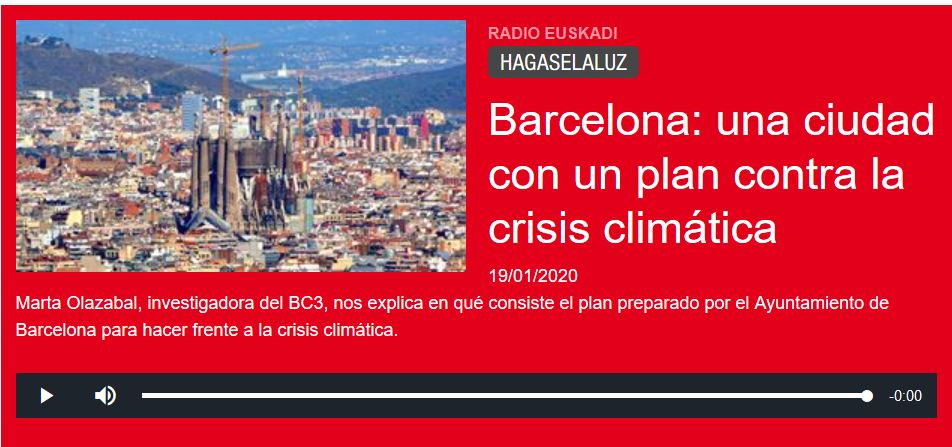January 20, 2020
Published by Unai Pascual BC3Research at January 20, 2020
Categories
Unai Pascual, investigador Ikerbasque en Basque Centre for Climate Change y co-autor del último informe de IPBES, ha participado en la jornada "Prosperidad sin Naturaleza" en Barcelona, una jornada organizada por la comisión de Economía y Sostenibilidad del Colegio de Economistas de Cataluña, el Departamento de Territorio y Sostenibilidad, el Consejo Asesor para el Desarrollo Sostenible ( CADS), el Centro de Investigación Ecológica y Aplicaciones Forestales (Creaf) y el Centro Tecnológico Forestal de Cataluña (CTFC). El investigador destacó la necesidad de ir hacia una economía verde y enfocarnos hacia un nuevo modelo económico. "Se deben fomentar nuevos valores en la economía que vayan más allá de la productividad", aseguró, y remarcó la necesidad de poner énfasis en la biodiversidad, porque, como dijo, "está muy lejos de tener la relevancia que debería tener ".
January 22, 2020
Published by Marta Olazabal BC3Research at January 22, 2020
Categories
Marta Olazabal, investigadora del Basque Centre for Climate Change y especializada en adaptación y resiliencia urbana, ha valorado la declaración de emergencia climática y el plan de acción contra la crisis climática del Ayuntamiento de Barcelona este domingo en el programa de Radio Euskadi, Hágase la Luz. Para la investigadora, el plan de Barcelona es un “hito” a nivel nacional. Las 100 medidas y 7 cambios de modelo traerán “cambios fuertes en todos los ámbitos para hacer frente al cambio climático”.
January 22, 2020
Published by BC3Research Elisa Sainz de Murieta at January 22, 2020
Categories
Sea-level rise represents one of the main impacts of climate change. Globally, low elevation coastal areas represent 2% of the surface area, but account for 10% of the world's population and many of the economic assets and infrastructures. Moreover, the increase in sea level causes extreme values occur more frequently, affecting the exposed communities and assets (environmental and economic) more severely. This also generates an increase in the erosion rate, increasing the recoil of the coastline, which in turn makes the coastal and active resources located there much more exposed. In this context, it is essential to understand current and future risks and a number of studies show the need to adapt the format of the information to the agents who need to make decisions on adaptation.
February 17, 2020
Published by BC3Research at February 17, 2020
This infographic video has been produced by BC3- Basque Centre for Climate Change to graphically illustrate an introduction TO k.LAB and Integrated Modelling for non-technical audiences. We present the Philosophy embracing the FAIR principles and the Technology behind a cutting edge modelling environment for Knowledge Integration. K.LAB is a web accessible software that uses the meaning of information, its semantics, to integrate knowledge through Artificial Intelligence and builds computational solutions to environmental, policy and sustainability problems. Through this modelling environment, researchers can contribute knowledge from their discipline and seamlessly connect it to the knowledge generated by others through the use of shared semantics. The result is a powerful tool where users can enter their queries and k.LAB is able to select the most appropriate knowledge available building for the first time new knowledge from the integration of the existing one.




